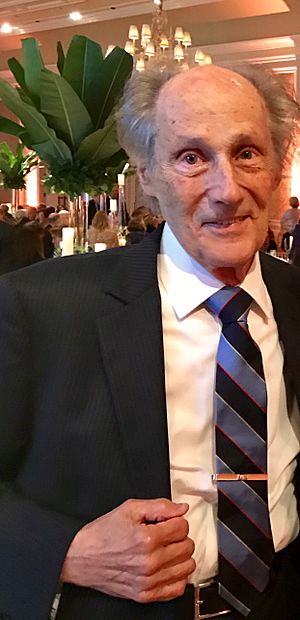Lawrence Rocks (chemist) facts for kids
Quick facts for kids
Lawrence Rocks
|
|
|---|---|
 |
|
| Born | August 27, 1933 New York City, U.S.
|
| Alma mater | Purdue University (M.S.) Technische Hochschule Vienna (D.Sc) |
| Occupation | Chemist / Prof. Emeritus, Long Island University |
| Known for | Chemistry, Analytical chemistry, Energy, Environmental science |
|
Notable work
|
The Energy Crisis (Crown Publishers, 1972), Fuels For Tomorrow (PennWell Publishers, 1980) |
| Spouse(s) | Marlene Rocks (married 1968) |
| Children | Burton Rocks |
Lawrence Rocks (born August 27, 1933) is an American chemist and author. He has written books about important topics like energy problems and biofuel (fuels made from plants). He also writes about how chemistry connects with sports, especially baseball.
His book, The Energy Crisis, came out in 1972, just before the big 1973 oil crisis happened. This book made him famous and helped lead to the creation of the U.S. Department of Energy, which is a government group that deals with energy.
Rocks has also worked with professional baseball player Paul DeJong to explore the role of chemistry in baseball.
Contents
Lawrence Rocks' Career and Education
Lawrence Rocks earned his Masters of Science degree from Purdue University. He then received his Doctor of Science degree from Technische Hochschule Vienna in Austria. For his doctoral work, he studied analytical chemistry. This field focuses on understanding what things are made of and how much of each part there is.
Rocks is now a Professor Emeritus of Chemistry at Long Island University. This means he is a retired professor who is still highly respected by the university.
Rocks' Work on Energy
Rocks wrote an important book called The Energy Crisis in 1972. In this book, he suggested that the United States needed a special national center to handle energy issues. His idea helped influence the creation of the U.S. Department of Energy by the government.
After his book was published, Rocks became well-known. He was featured in magazines like Time Magazine and National Review. He also spoke at the United Nations and appeared on popular TV shows like The Today Show. Rocks even had his own column in a newspaper syndicate.
In 1980, Rocks wrote another book called Fuels For Tomorrow. This book was a follow-up to The Energy Crisis. In it, he talked about how fermentation chemistry could be important for the future of farming. He believed this process was much safer for the environment.
Chemistry and Sports
In 2017, Lawrence Rocks did an interesting experiment about how temperature affects a baseball. He worked with Paul DeJong, a professional baseball player, as his assistant. They found that a baseball bounces best when the temperature is between 68 and 75 degrees Fahrenheit. This is because at colder temperatures, the rubbery parts of the ball become stiff. At warmer temperatures, they become too soft.
Rocks appeared on MLB Network in 2017. He explained that sports chemistry is about combining modern analytical chemistry with sports data. In 2018, Chemical & Engineering News interviewed Rocks. He shared his belief that "Everybody can do" science.
The St. Louis Cardinals' Cardinals Insider also interviewed Rocks in 2018. They asked if music plays a role in science. Rocks explained that there is a "molecular rhythm to life" and that body rhythms might help us understand the mind one day.
In 2018, the company Topps, which makes baseball cards, mentioned Rocks on the back of Paul DeJong's "future stars" baseball card. DeJong said that Rocks helped him think differently about his off-season training. During the 2018 off-season, Rocks and DeJong gave talks at the Society of the Four Arts. They discussed how tendons and breathing are important for athletes. Rocks advised that while "Weightlifting is great," it's important not to lose flexibility.
Topps even made a special collectible card for Lawrence Rocks in their 2019 card set.
Personal Life
Lawrence Rocks and his wife, Marlene, were married in 1968. They have one son, Burton Rocks, who is a writer and a sports agent. Lawrence Rocks also supports the Palm Beach Symphony.
 | Tommie Smith |
 | Simone Manuel |
 | Shani Davis |
 | Simone Biles |
 | Alice Coachman |

